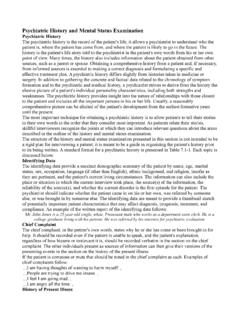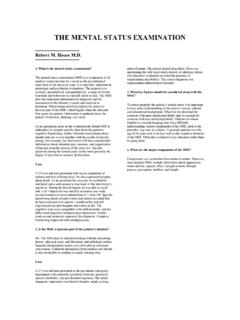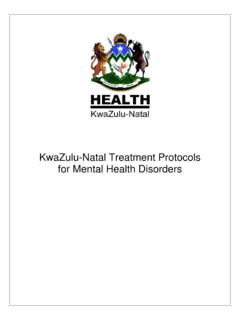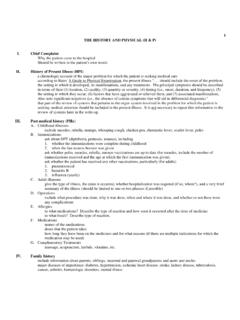Transcription of PSYCHIATRIC MENTAL STATUS EXAM Faculty: Tamara Gay, MD ...
1 PSYCHIATRIC MENTAL STATUS EXAM Faculty: Tamara Gay, MD Department of Psychiatry Reading: Section on the MENTAL STATUS exam in whichever physical diagnosis text you are using. (In Bates, A Guide to Physical examination and history Taking, 7th Edition, pp 107-128) Learning Objectives: After completing the reading, attending the lecture, and attending a small group discussion on the PSYCHIATRIC MENTAL STATUS exam, the student should be able to: 1. List the parts of the MENTAL STATUS exam. 2. Define: mood, affect, thought process, thought content, illusion, and hallucination. 3. Know how to assess a patient s intellectual (cognitive) functions including: orientation, concentration/attention, memory, use of language, fund of knowledge, abstract thinking, insight and judgement.
2 Sample Quiz Question: Asking what he or she would do if he or she found a stamped and addressed envelope on the ground is one way to test a patient s: A. Abstract thinking B. Fund of knowledge C. Attention D. Recent memory E. Judgement Answer: E The PSYCHIATRIC MENTAL STATUS Exam (MSE) Checklist I. Appearance and behavior Dress, grooming, hygiene Posture and gait Facial expression Eye contact (and relatedness to examiner) Motor activity Other mannerisms or behaviors Degree of cooperation with exam II. Speech Rate Quantity Volume (loudness) Fluency Clarity (articulation) III. Emotions Mood: Pervasive and maintained emotional state, sometimes given in patient s own words.
3 Examples: sad, happy, angry, anxious. Affect: Outward manifestation of mood. How the patient shows his feelings. Predominant Intensity Lability Appropriateness IV. Thought Process: Associations. How ideas fit together, including rate and flow. Content: What is being thought. V. Perceptions Illusions: Misinterpreted sensory inputs. Hallucinations: Perceiving input in absence of external sensory stimulation. VI. Sensorium and intellectual (cognitive) functions (See attached table) Level of Consciousness Orientation Concentration/ Attention Memory Immediate (new learning)
4 Recent Remote Use of Language Comprehension Repetition Naming Reading Writing Fund of knowledge Abstract thinking Insight Judgement VII. How the patient makes you feel. MINI- MENTAL STATE examination Patient _____ Examiner _____ Date _____ Maximum Score Score Orientation 5 ( ) What is the (year) (season) (date) (month)?
5 5 ( ) Where are we: (state) (country) (town) (hospital) (floor) Registration 3 ( ) Name three objects: 1 second to say each. Then ask the patient all three after you have said them. Give 1 point for each correct answer. Then repeat them until he learns all three. Count trials and record. Trials _____ Attention And Calculation 5 ( ) Serial 7s. 1 point for each correct. Stop after five answers. Alternatively, spell world backwards. Recall 3 ( ) Ask for the three objects repeated above. Give 1 point for each correct answer. Language 9 ( ) Name a pencil, and watch. (2 points). Repeat the following: No ifs, ands, or buts.
6 (1 point) Follow a three-stage command: Take a paper in your right hand, fold it in half, and put it on the floor. (3 points) Read and obey the following: Close your eyes (1 point) Write a sentence. (1 point) Copy design. (1 point) Perfect score = 30 Any score below 25 indicates the presence of significant cognitive dysfunction. Assess the level of consciousness along a continuum: Alert Drowsy Stupor Coma (Used with permission from Folstein MF, Folstein SE, McHugh PR: Mini- MENTAL State: A practical method for grading the cognitive state of patients for the clinician.)
7 J PSYCHIATRIC Res 12:189-198, 1975) Clinical psychiatry for medical students / edited by Alan Stoudemire. - 3rd ed. 1998







